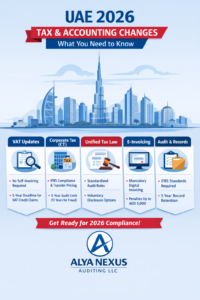
UAE 2026 Tax, VAT, Corporate Tax, Audit & Accounting Updates: A Complete Guide
UAE 2026 Tax, VAT, Corporate Tax, Audit & Accounting Updates The UAE continues to enhance its tax and financial compliance framework to align with global
Home » Internal Audit Scope is Moving From Compliance To Operational Excellence
Internal auditors have traditionally been perceived as compliance people who help keep the business world honest. They verify everyone is following the rules by looking for errors, omissions, and internal controls issues. Audits have evolved beyond safeguarding assets and enforcing policies to preserve value. The internal auditor has added value creation for the organization to his tool belt. Today’s auditors collaborate with management to mitigate risk and prioritize goals and objectives. They identify complexity and redundancy and ways to streamline operations and reduce costs.
Risk management is the process of identifying, assessing, and controlling threats to an organization’s capital and earnings. These threats, or risks, could stem from a wide variety of sources, including financial uncertainty, legal liabilities, strategic management errors, accidents, and natural disasters.
Enterprise Risk Management (ERM) has emerged to help identify and assess the institutional risks that could preclude the achievement of goals and objectives within an organization. This framework for evaluating risks gives management the advantage of grasping opportunities within their reach by taking advantage of favorable conditions in their market or operational environment. In a report by the Poole College of Management at North Carolina State University entitled “2019 The State of Risk Oversight,” survey respondents of organizations that have not yet adopted an ERM approach indicated that they do not think ERM is a priority or benefits do not outweigh costs. In reality, prioritizing ERM can provide an organization with the tools it needs to achieve its objectives:
There is value in collaboration between the ERM and the Internal Audit risk assessment processes. The ERM process provides input to Internal Audit on areas management considers high risk. In return, Internal Audit objectively assesses the system of internal controls and informs management on the areas where there is opportunity to strengthen the system of internal controls and increase efficiency of operations.
The scope of a comprehensive internal audit goes beyond checking the boxes and into the realm of an array of value-added services. A robust internal audit includes the following components:
Many studies in 2018 reveals that many internal audit functions are embracing new technologies. For example, it is expected that by 2020 using governance, risk management, and compliance technology tools will increase from 23% to 62%. Indeed, the role of technology in internal auditing has opened up many possibilities that expand the capabilities of audits. With the exponential growth of data, new tools for data mining, and unlimited processing power of today’s computers, the future is bright for extracting the insights needed to drive economic growth. With the rapid advances in machine learning and artificial intelligence, the functions of internal audit will reach a new level of insights that has few limitations.
Internal audit reporting includes a formal report and may include a preliminary or memo-style interim report. An interim report typically includes sensitive or significant results the auditor thinks the board of directors needs to know right away. The final report includes a summary of the procedures and techniques used for completing the audit, a description of audit findings, and suggestions for improvements to internal controls and control procedures. The formal report is reviewed with management and recommendations for improvement are discussed. Follow up after a period of time is necessary to ensure the new recommendations have been implemented and have improved operating efficiency.
The capabilities of internal audit have been elevated from the day-to-day activities of compliance and monitoring to adopting a much broader role in business consulting, helping to add value at all levels of the organization that will accelerate growth and eliminate unnecessary spending. Armed with these new tools, today’s internal auditor is primed to venture into the unchartered territory of unlimited potential in the modern business landscape.
Alya Auditors serves businesses in the UAE with their experience in accounting. Experts will help them grow their business without having to combat challenges posed by inefficiencies in accounting tasks. We can also help entrepreneurs looking to start their dream business in the UAE. Get end-to-end accounting support coupled with the benefits of new-age technology that they use to boost your accounting tasks.
Apart from the above services we are also helping the companies and businesses in the UAE to file their ESR notification.
Learn more about Alya Auditors and its offerings.

UAE 2026 Tax, VAT, Corporate Tax, Audit & Accounting Updates The UAE continues to enhance its tax and financial compliance framework to align with global

UAE Regulatory Changes from January 2026: What Residents and Businesses Must Know As the UAE continues to evolve as a global economic hub, significant regulatory
Business Setup in the UAE: Mainland, Free Zone, or Offshore? The UAE is a global business hub offering multiple setup options to suit different business

Real-Time Analytics in Finance: How Dubai Firms Are Turning Data into Strategy “Data that arrives too late is a report — not a strategy.” In
Truly, let us know what service you are looking for and hence we can get back to you with more details.
Silver Tower, Business Bay. PO Box: 41102, Dubai, UAE.
Sharjah Airport Free Zone PO Box: 120403 Sharjah, UAE.
+971 48769377
+971 52 9750690 , +971 50 522 1035
Mon – Fri : 8:30 AM – 6 PM
Saturday – 9 AM – 5 PM
Sunday – Closed
© Alya Auditors 2022 All Rights Reserved